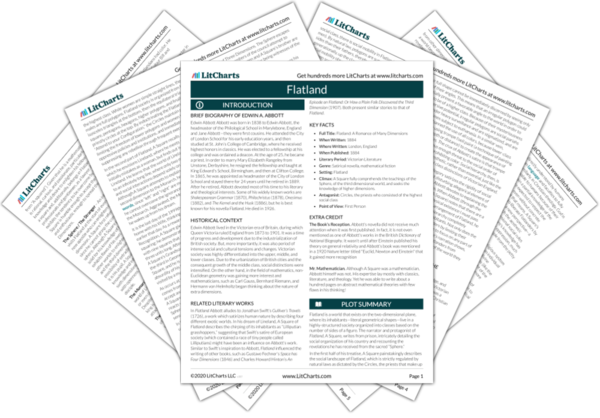Welcome to the LitCharts study guide on Edwin A. Abbott's Flatland. Created by the original team behind SparkNotes, LitCharts are the world's best literature guides.
Flatland: Introduction
Flatland: Plot Summary
Flatland: Detailed Summary & Analysis
Flatland: Themes
Flatland: Quotes
Flatland: Characters
Flatland: Symbols
Flatland: Literary Devices
Flatland: Theme Wheel
Brief Biography of Edwin A. Abbott

Historical Context of Flatland
Other Books Related to Flatland
- Full Title: Flatland: A Romance of Many Dimensions
- When Written: 1884
- Where Written: London, England
- When Published: 1884
- Literary Period: Victorian Literature
- Genre: Satirical novella, mathematical fiction
- Setting: Flatland
- Climax: A Square fully comprehends the teachings of the Sphere, of the third dimensional world, and seeks the knowledge of higher dimensions.
- Antagonist: Circles, the priests who consisted of the highest social class
- Point of View: First Person
Extra Credit for Flatland
The Book’s Reception. Abbott’s novella did not receive much attention when it was first published. In fact, it is not even mentioned as one of Abbott’s works in the British Dictionary of National Biography. It wasn’t until after Einstein published his theory on general relativity and Abbott’s book was mentioned in a 1920 Nature letter titled "Euclid, Newton and Einstein" that it gained more recognition
Mr. Mathematician. Although A Square was a mathematician, Abbott himself was not. His expertise lay mostly with classics, literature, and theology. Yet he was able to write about a hundred pages on abstract mathematical theories with few flaws in his thinking!







